September 2020 Advocate: AFT 1493 holds teach-in on “Social Justice Unionism”
SOCIAL JUSTICE UNIONISM
This is what solidarity looks like!
AFT 1493 holds teach-in on “Social Justice Unionism in Practice: From Part-Time Pay Parity to Anti-Oppression Organizing”
by Katharine Harer, AFT 1493 Vice President & Outreach Organizer; Jessica Silver-Sharp, AFT 1493 Secretary; and Marianne Kaletzky, AFT 1493 Executive Secretary
Over 170 teachers, students, staff and community members gathered online on Thursday September 10 at AFT 1493’s teach-in on social justice unionism and systemic inequities to listen, learn and show solidarity with our part-time faculty members, who are consigned to the bottom of the two-tiered system in our district. The inequities experienced by our part-time  faculty were described by Kolo Wamba, (photo at left) formerly part-time and recently full-time in Physics at Skyline College, in his Welcome address (view video) at the opening Plenary session. Wamba connected the dots between the exploitation of part-time teachers and the devouring nature of predatory capitalism.
faculty were described by Kolo Wamba, (photo at left) formerly part-time and recently full-time in Physics at Skyline College, in his Welcome address (view video) at the opening Plenary session. Wamba connected the dots between the exploitation of part-time teachers and the devouring nature of predatory capitalism.
Wamba was followed by community organizer and teacher, Gustavo Lopez (photo at right), who told the story of his commitment to social justice from the time he was 11 years old growing up in South San Francisco. (view video) Lopez is currently working with a group of young activists in the organization, Change South SF, a multigenerational and multicultural coalition in South City which advocates for social justice reforms such as police reform, increased mental health and other community services, and affordable housing.
11 years old growing up in South San Francisco. (view video) Lopez is currently working with a group of young activists in the organization, Change South SF, a multigenerational and multicultural coalition in South City which advocates for social justice reforms such as police reform, increased mental health and other community services, and affordable housing.
 The third scheduled Plenary speaker, Sarah Harmon (photo at left), a part-time Spanish professor at Cañada College, made a video for the event which was posted online because of time considerations. Sarah powerfully calls out the unfair treatment of part-timers like herself. This is a must-watch! (view video)
The third scheduled Plenary speaker, Sarah Harmon (photo at left), a part-time Spanish professor at Cañada College, made a video for the event which was posted online because of time considerations. Sarah powerfully calls out the unfair treatment of part-timers like herself. This is a must-watch! (view video)
Fired up and ready for more, we dispersed to our three different concurrent sessions.
Session I: Part-Time Compensation as a systemic social inequity / the “two-tier system”
Pete Seeger’s rendition of the strike song he made famous, “Which side are you on?” set a tone of action for more than 50 members in attendance at the Teach-In’s first breakout session.
Skyline College physics instructor Kolo Wamba kicked off the discussion with an explanation of the inequities he’d realized through his own transition from industry scientist to part-time faculty member to newly hired full-time faculty.
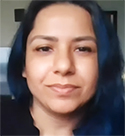 Maryam Khan (photo at left), adjunct faculty in Engineering at Skyline, carried the theme forward, calling in particular for immediate reform to District policies that limit access to healthcare for part-time faculty. Explaining the myriad of burdens that fall on part-time shoulders, Prof. Khan told how she’d lost her health insurance after losing her full-time temporary teaching position, then experienced problems that prevented her from receiving benefits from Covered California, and finally found herself ill and without any coverage at all. Part-timers “aren’t treated the same way [as full time faculty].” During the pandemic especially, “they’ve faced the additional burden of transitioning online at multiple colleges using multiple course management systems all at once. Full timers haven’t experienced this challenge. Additionally, “courses might be canceled after we’ve already completed the work of preparing for them. Other courses might be offered at short notice or reassigned at the last minute.” (view video)
Maryam Khan (photo at left), adjunct faculty in Engineering at Skyline, carried the theme forward, calling in particular for immediate reform to District policies that limit access to healthcare for part-time faculty. Explaining the myriad of burdens that fall on part-time shoulders, Prof. Khan told how she’d lost her health insurance after losing her full-time temporary teaching position, then experienced problems that prevented her from receiving benefits from Covered California, and finally found herself ill and without any coverage at all. Part-timers “aren’t treated the same way [as full time faculty].” During the pandemic especially, “they’ve faced the additional burden of transitioning online at multiple colleges using multiple course management systems all at once. Full timers haven’t experienced this challenge. Additionally, “courses might be canceled after we’ve already completed the work of preparing for them. Other courses might be offered at short notice or reassigned at the last minute.” (view video)
 Skyline Middle College adjunct faculty member Timothy Rottenberg (photo at left), facilitating the session, shared a chart graphing salaries of part-time faculty at Bay Area community colleges and questioned why, with our Basic Aid funding model, do salaries in our District rank from the middle to the worst? Why does our District remain in violation of the 50% law? Why does SMCCD refuse to set a pay parity goal for part-time faculty as required by a 2000/2001 state mandate, one that the vast majority of other California community colleges have complied with? (view video)
Skyline Middle College adjunct faculty member Timothy Rottenberg (photo at left), facilitating the session, shared a chart graphing salaries of part-time faculty at Bay Area community colleges and questioned why, with our Basic Aid funding model, do salaries in our District rank from the middle to the worst? Why does our District remain in violation of the 50% law? Why does SMCCD refuse to set a pay parity goal for part-time faculty as required by a 2000/2001 state mandate, one that the vast majority of other California community colleges have complied with? (view video)
Part-time college faculty are one part of that major economic trend of our time–the creation of “the precariat.” So many of us increasingly work and live with minimal or no benefits, low pay, and no stability. I sometimes have really good students who are interested in getting advanced degrees and pursuing a career in higher education, but the practical realities make it hard to recommend.
– Jeff Diamond, part-time Political Science Instructor, Skyline College, teach-in participant
Lyft drivers Alan Franklin (listen) and Edan Alva (view video) described the oppressive conditions of gig work and why it is critical to vote “No” on California’s Proposition 22, which would take away job protections, like sick leave, health benefits, and minimum wages.
Students spoke about the real challenges of supporting themselves in the face of limits on student employment. College of San Mateo panel participant Hannah Hersey asked, “Why is there a lack of conversation on our campuses about student work and pay? This prevents students from organizing for better pay and conditions.” She added, ”Students should be required to learn about their teacher’s rights.” She concluded with a call for unity.Shannon, a former Middle College student, asked “Why are [part-time faculty members] treated so differently [from full-time teachers]?” A student named Edward said he was “shocked” by how little part-time teachers were paid compared to other full-time faculty.
During the Teach-In, I realized the severity of the barrier that comes between students and faculty regarding the fairness of work. Most—if not all—students in America are aware that teachers are underpaid and that public education is underfunded, yet this idea is displayed with such certainty that we have largely come to expect it without wondering why or how it can be changed… The knowledge I gained about the disparities between full-time and part-time faculty, along with the interest and passion that was displayed by my fellow students, inspires me to learn more about what I can do to help all the hardworking faculty members on all of our campuses.
– Hannah Hersey, CSM student
Session 2: Organizing in our workplaces and communities
In the second breakout session, a number of young activists discussed how local organizing can make gains against injustice—in the workplace and beyond. From union campaigns in fast food and gig work, to grassroots efforts to defund the police, to insurgent electoral campaigns like the one that sent Alexandria Ocasio-Cortez to Congress, recent years have shown that local organizing can stand up to powerful, entrenched interests. But what makes organizing successful?
“Organizing in Our Workplaces and Communities NOW” began with panelists exploring how they define union and community organizing. Fiona Marten, who has organized workers at the Burgerville fast food franchise in Oregon, defined a union not just as a group that has official recognition or a contract, but above all as a collective of workers willing to fight for one another. At Burgerville, workers organized to win legal recognition of their union as well as a raise. But they also went beyond concerns traditionally understood as labor issues—like compensation and benefits—and leveraged their solidarity to make gains that mattered for particular marginalized communities. In an example of what’s often called social justice unionism, unionized Burgerville workers successfully pressured their employer to stop using E-verify, a voluntary program intended to single out workers without documentation.
 Sam Avila Gomez (photo at left), a student at South San Francisco high school and organizer with community initiative Change SSF (see more about Change SSF), similarly defined community organizing as a form of solidarity-building work. Avila Gomez spoke of organizing as “gathering the needs of your community” and emphasized that it doesn’t require going outside your ordinary activities: organizing happens at the grocery store and at school, as an individual identifies community needs and works to build solidarity around them. Change SSF is currently working in South San Francisco to defund the police, create police-free schools, and improve city health and wellness services.
Sam Avila Gomez (photo at left), a student at South San Francisco high school and organizer with community initiative Change SSF (see more about Change SSF), similarly defined community organizing as a form of solidarity-building work. Avila Gomez spoke of organizing as “gathering the needs of your community” and emphasized that it doesn’t require going outside your ordinary activities: organizing happens at the grocery store and at school, as an individual identifies community needs and works to build solidarity around them. Change SSF is currently working in South San Francisco to defund the police, create police-free schools, and improve city health and wellness services.
Although labor and community organizing have often been understood as distinct efforts, a number of participants noted how both forms of organizing can work together. Valarie Bachelor, an organizer with the California Federation of Teachers, described mobilizing teachers, staff, and parents for safe school reopening in Marin County. By facilitating conversations between workers and the community, organizers were able to highlight their shared interest in making sure schools were safe for everyone who spent time in them.
In the last section of the session, participants talked about which demands they see as most pressing and how they envision organizing to win them. James Coleman, a college student who organizes with Change SSF, emphasized the need for universal pre-K and rental and mortgage assistance in South San Francisco. He explained how community needs motivated him to mount a campaign for South San Francisco City Council against 18-year incumbent Rich Garbarino. (See more about James’ campaign.)
Other participants spoke of the imperative to take action on the demands of Black students and faculty at the SMCCD, the need for part-time parity, and the need for affordable housing in San Mateo County—a provision that would not only improve the lives of SMCCD faculty and staff, but also of the community as a whole.
Session 3: Racial & gender justice on our campuses
Session 3 began with inspiring stories from four panelists: Masao Suzuki, full-time Economics professor at Skyline College; Danielle Powell, Skyline full-time Speech-Communications professor; Dontario Beverly, former Cañada College Black Student Union President and Chris Collins, part-time History professor at Skyline.
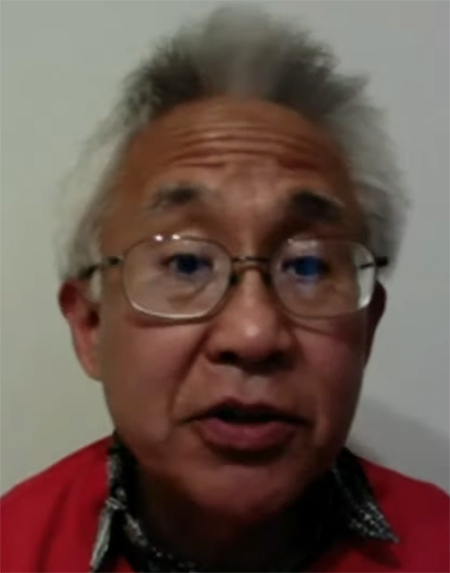 Masao Suzuki talked about the importance of having a strong union to protect faculty who fight for racial and economic fairness. He described his own experience when he lost a teaching job because he stood up for a colleague of color and there was no union to defend him. He said he was grateful to come to our District where he knew he could speak up for what he believed in and couldn’t be punished because the union had his back. (listen to audio)
Masao Suzuki talked about the importance of having a strong union to protect faculty who fight for racial and economic fairness. He described his own experience when he lost a teaching job because he stood up for a colleague of color and there was no union to defend him. He said he was grateful to come to our District where he knew he could speak up for what he believed in and couldn’t be punished because the union had his back. (listen to audio)
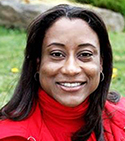 Danielle Powell showed a moving video of some of the women in the Women’s Mentoring and Leadership Academy (WMLA), a program she founded at Skyline to empower women students. She went on to talk about the “emotional labor” of giving complete and compassionate support to students, labor which is unpaid and often unseen by administrators. She noted that women often perform this type of emotional labor and that it isn’t captured in our contract or our evaluation procedures, but it should be. This caring labor makes all the difference for our fragile students, but it takes enormous energy from faculty members. (listen to audio)
Danielle Powell showed a moving video of some of the women in the Women’s Mentoring and Leadership Academy (WMLA), a program she founded at Skyline to empower women students. She went on to talk about the “emotional labor” of giving complete and compassionate support to students, labor which is unpaid and often unseen by administrators. She noted that women often perform this type of emotional labor and that it isn’t captured in our contract or our evaluation procedures, but it should be. This caring labor makes all the difference for our fragile students, but it takes enormous energy from faculty members. (listen to audio)
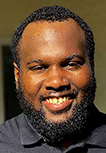 Former Cañada Black Student Union President, Dontario Beverly, spoke powerfully about the ongoing trauma that exists in the Black community. He made the point that our Black students don’t have enough role models among professors on our campuses because the vast majority of the teaching staff is White — and that this needs to change. He called on the district to put its money where its mouth is and work harder for true equity for students of color. (listen to audio)
Former Cañada Black Student Union President, Dontario Beverly, spoke powerfully about the ongoing trauma that exists in the Black community. He made the point that our Black students don’t have enough role models among professors on our campuses because the vast majority of the teaching staff is White — and that this needs to change. He called on the district to put its money where its mouth is and work harder for true equity for students of color. (listen to audio)
 The fourth panelist, Chris Collins, began by telling his own story. He was taught by his parents to hide his hurt and stuff his feelings about unfairness and discrimination. He showed a slide of himself as a young boy, tender and open. He learned as he grew older that he had to “share the hurt” rather than hide it. Collins recounted an anecdote about his own schooling when he worked full time while he was a community college student. One of his teachers locked the door on him because he was a few minutes late to class – late because he had worked the graveyard shift the night before. When he knocked on the locked door, his teacher turned his back on him. At that point, he decided, “higher education wasn’t built for someone like me.” Collins went on to talk about “the pain inside higher education.” (listen to audio)
The fourth panelist, Chris Collins, began by telling his own story. He was taught by his parents to hide his hurt and stuff his feelings about unfairness and discrimination. He showed a slide of himself as a young boy, tender and open. He learned as he grew older that he had to “share the hurt” rather than hide it. Collins recounted an anecdote about his own schooling when he worked full time while he was a community college student. One of his teachers locked the door on him because he was a few minutes late to class – late because he had worked the graveyard shift the night before. When he knocked on the locked door, his teacher turned his back on him. At that point, he decided, “higher education wasn’t built for someone like me.” Collins went on to talk about “the pain inside higher education.” (listen to audio)
In the response to the need for real change, AFT 1493 has launched an Anti-Oppression/Social Justice Committee to work to focus on and address racial and gender injustice in our workplaces and our union. The next meeting is Friday, September 25, 11am-noon. If you are interested in joining or learning more about this committee, please contact Rika Yonemura-Fabian.
Safe Space for adjunct faculty
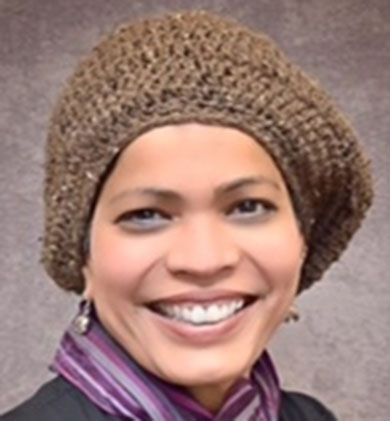 After the concurrent sessions, a special session was held for adjunct faculty only. This “safe space” for part-time faculty to talk about their lived experiences and to share
After the concurrent sessions, a special session was held for adjunct faculty only. This “safe space” for part-time faculty to talk about their lived experiences and to share  their stories was facilitated by Suji Venkataraman (photo at left), Skyline College Education/Child Development part-time professor, and Annie Corbett (photo at right), Cañada College and Skyline College Psychology part-time professor.
their stories was facilitated by Suji Venkataraman (photo at left), Skyline College Education/Child Development part-time professor, and Annie Corbett (photo at right), Cañada College and Skyline College Psychology part-time professor.
Lisa Suguitan Melnick, CSM part-time Kinesiology professor, attended both the third session on race and gender justice and the safe space session and described her feelings about what she experienced:
“Joining the teach-in showed me that the SMCCD community consists of brilliant, like minds who, through sharing our stories, shed light on the fact that our district speaks but doesn’t act for its own community. The stories revealing racial and gender inequalities were at once painful and liberating, as I came to know that I was not alone in these experiences and observations. Many mirrored one another’s humiliating experiences in the hiring practices and procedures, how, at the end of the day, we don’t feel a sense of Belonging. ‘We need to belong to feel successful.’ Pain–created by a lack of respect, value for, and fair compensation for the Part-timer faculty who comprise 70% of the faculty– brought many of us to tears in the Part-timers safe space sharing. Do I feel hopeful about this district making changes? I will put my trust in those who earn it by talking less, and doing more.”
Annie and Suji are planning to hold more safe space sessions for adjunct faculty in the near future. If you are a part-timer and you are interested in attending or have questions, contact Annie or Suji.
